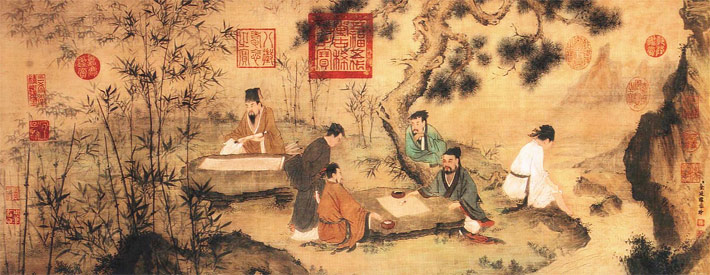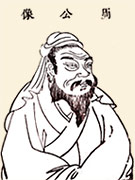
The Axial Age:
China
Chinese Axial Age philosophers expressed a new ethic in response to social and cultural upheaval. Instead of simply serving our own interests or the interests of friends, family, clan and nation, we should accept responsibility for our own life, actions and thoughts. They taught that we are capable of a higher morality, the achievement of which is our obligation. Thus, later in the Axial Age, the Dao became something beyond expression but knowable: The Truth. Confucius would make very little reference to the Way of Heaven and referred to the Dao as something absolute towards which an individual could progress.
The Chinese Axial Age began around 530 BCE. In common with the inception of all Axial Age transformations, it was against a background of social and cultural change and turmoil which forced people to question their traditional beliefs.
As a solution, their most honored Axial sages would attempt to move the Chinese worldview from selfishness to selflessness. These philosophers still recognized the value of the old rituals for their beauty and transformative power, but a new creative era of reflection and responsibility would emerge, ushered in by Confucius (the “Master Kong”).
Since Confucius was inspired by the ideas of the duke of Zhou, whom he saw as a visionary ahead of his time, we will begin the story of the Chinese Axial Age over 500 years before its generally accepted start date, with the rise of the Zhou Dynasty.
The Fall of Shang and Rise of Zhou Dynasty (1045–221 BCE)
For historical context, see Ancient China.
The last Shang ruler was a despot who was defeated on the battlefield by king Wen of the Zhou at Mu-Ye, north of the yellow River. The Zhou was a frontier tribe that ruled the Wei Valley. Half a millennium later, the philosopher Mozi (472–391 BCE), wrote:
“During the reign of the last Shang Emperor, Heaven could not endure his failures, neglect and immorality. Heaven brought strange cataclysmic events down on the Emperor and his empire. A red bird arrived bearing a message: ‘Heaven decrees King Wen of Zhou to punish Yin [the Shang capital] and possess its empire.’”
In 1045 BCE king Wen of the Zhou attacked the Shang. The king was killed during the invasion, and his son Wu assumed leadership and eventually defeated the Shang.
The Zhou lived a not dissimilar life to the Shang. Their cities and lifestyle melded easily, and not untypically for ancient times, having defeated the Shang they combined their own sky god, “Tian,” with the Shang god, “Di” who became “Tian Shang Di”—Heaven Most High.
When King Wu died only a few years later, the heir to the throne, Prince Cheng, was still a minor. So the duke of Zhou stepped in as regent and effectively ruled until Prince Cheng could assume his role as monarch.
Zhou Dynasty (1045–221 BCE)
Around 1045 BCE, the duke of Zhou introduces ethics into religion with the doctrine of the Mandate of Heaven.
Hundred Schools of Thought Period (770–21 BCE)
Spring & Autumn Period (770–476 BCE)
Confucius (551–479 BCE)
Warring States Period (476–221 BCE)
Mozi (480–390 BCE)
Yangzi (440–360 BCE)
Huizi (370–319 BCE)
Zhuangzi (370–311 BCE)
Meng Ke (Mencius) (370–288 BCE)
The Mandate of Heaven

In order to legitimize their conquest, the duke of Zhou introduced the concept of the Mandate of Heaven. It declared that the Shang had lost the battle because they had become corrupt and unjust. Heaven had nominated the Zhou due to their “deep commitment to justice” to rule in their place. The duke claimed that this mandate had been given by Heaven to all the Zhou people, but he was outvoted by his brother and the young king.
So the Zhou reverted to the old, established pre-Axial idea, and the king retained his position of unique representative of Heaven on earth but one with a significant difference: the king should be virtuous and rule with justice.
Karen Armstrong writes in The Great Transformation, “It was an important moment. The Zhou had introduced an ethical ideal into a religion that had hitherto been unconcerned about morality. Heaven was not simply influenced by the slaughter of pigs and oxen, but by compassion and justice. The Mandate of Heaven would become an important ideal during the Chinese Axial Age.”
The Mandate of Heaven was based on four principles:
- The right to rule is granted by Heaven.
- There is only one Heaven therefore there can be only one ruler.
- The right to rule is based on the virtue of the ruler.
- The right to rule is not limited to one dynasty.
As Tianzi, or “son of Heaven,” the king alone administered the rights that ensured the natural order of the universe; he “opened the Way (Dao)” for Heaven on earth and was responsible for the harmonious relationship between Heaven, earth and all the natural world. To the Chinese there was no chasm separating Heaven and earth but a continuum maintained by complementary partners, both divine and equal to each other. Life here should be Heavenly. All ancestors had once lived on earth and could be reached through oracles and rituals, so people were united with their ancestors, even in their everyday actions. At death a supreme monarch would become a supreme ancestor.
The king’s function therefore was to follow the Way or Dao (or Tao). And he did this by performing his ritual duties exactly as prescribed, so that his power (diode) would maintain a state of divine stability—the Great Peace (tai-ping).
The pre-Axial concept of the Dao revolved around the king, who was the son of Heaven. Heaven was the provider of a mandate to the earthly kings who in turn must serve Heaven in order for harmony to prevail on earth. The king was an intermediary between Heaven and earth, and thus a divine person.
Court rituals, ceremonies and sacrifices were exactly defined and perfectly carried out in order to mirror the court of Heaven. As the Axial philosopher of the third century, Xunzi, would later recognize, the effect of these ceremonies could be transformative: “Through the performance of music the will is made pure, and through the practice of rites the conduct is brought to perfection, the eyes and ears become keen, the temper becomes harmonious and calm, and customs and manners are easily reformed.”
Thus, later in the Axial Age, the Dao became something beyond expression but knowable: The Truth. Confucius would make very little reference to the Way of Heaven and referred to the Dao as something absolute towards which an individual could progress.
